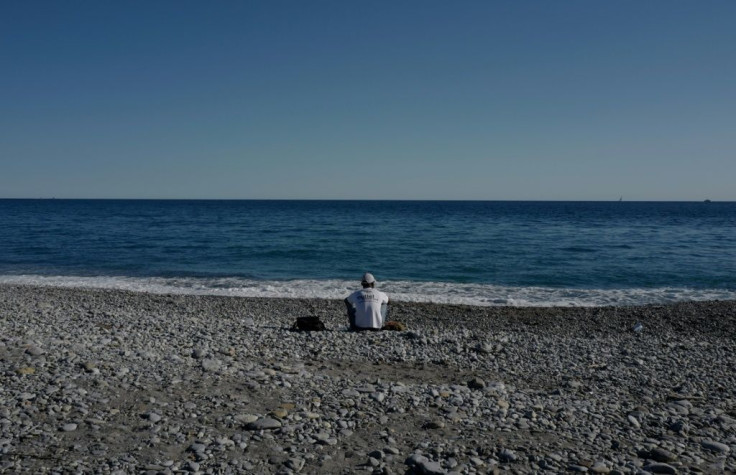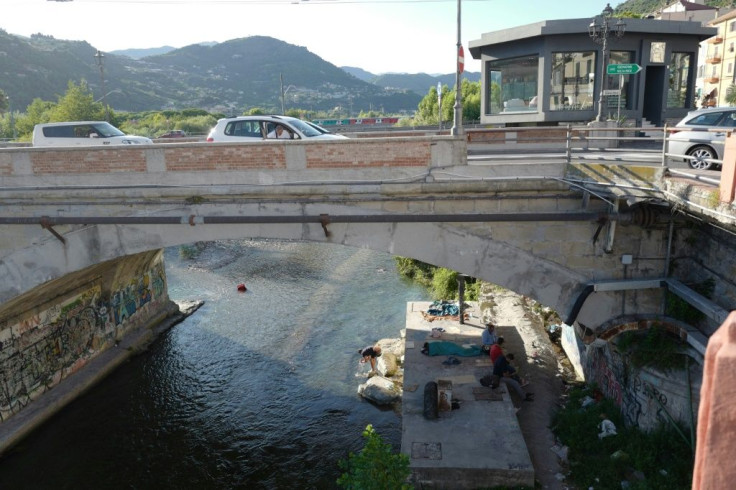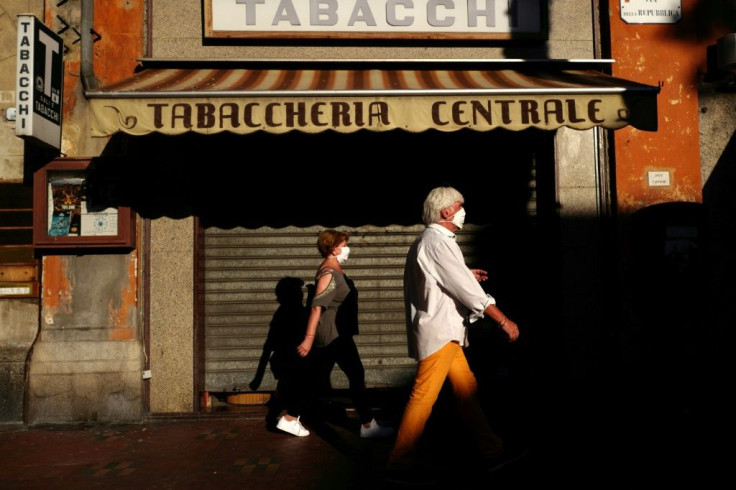Migrants Adrift After Camp At France-Italy Border Shut
Sudanese migrant Soulaimen has been sleeping on the beach in the Italian border town of Ventimiglia for 10 days now.
With his only shelter a sleeping bag and pasta meals donated by a charity, the 20-year-old is getting by as best he can after a transit camp run by the Italian Red Cross was ordered to stop welcoming new arrivals and cease operations.
Now, the migrants who continue to flock to this town hoping to cross into France are on their own, faced with strengthened border police and an uncertain future.
Vacant prefabricated buildings and weeds are all that remain of the camp, shut down over the coronavirus crisis by the provincial prefecture after four years in operation.

By September the toilets, showers and dormitories will all be dismantled. But migrants continue to pour in - from Sudan, Tunisia, Afghanistan, and beyond.
They sleep under bridges or on the beach and linger on the banks of the Roya river, their only place to bathe in the summer heat.
From January to July, attempts to cross from Libya to Italy increased by 91 percent compared to the same period last year, according to the UN High Commissioner for Refugees.

Many new arrivals head for France or Germany, but attempts to leave Italy -- by rail, motorway, or on foot -- are often thwarted, with some ending in death. According to an AFP count, at least 16 migrants have died trying to enter France from Italy since 2015.
Soulaimen, who did not wish to give his last name, has tried to reach France several times, but was always turned back.
Still, the young man originally from Sudan's war-torn Darfur region said he had no intention of giving up.
He says he cannot return home or to Libya, his jumping-off point for Europe and itself in the throes of a civil war.
Others agree. Why return home to a country where "there is nothing," ask the young Tunisians who wander around Ventimiglia hoping to reach France.

According to Italy's interior ministry, 4,000 of the nearly 12,000 migrants who arrived in Italy by July 24 this year are Tunisian.
"You find them everywhere in town, begging for money or a cigarette," said Vittorio, a 62-year-old accountant, walking his dog.
While he doesn't complain, migrants are a politically explosive subject in the town of 25,000 residents, headed since last year by a centre-right mayor backed by the far-right, anti-immigrant League party.

On Tuesday, League leader Matteo Salvini chose Ventimiglia to launch a tour of the Liguria region ahead of regional elections next month.
Riffing on familiar themes, Salvini exhorted voters to place "Italians first, the rest of the world afterwards."
After some detractors in the crowd greeted him with catcalls, Salvini retorted, "If you like illegal immigrants, take them home!"
Maurizio Marmo, who heads the local branch of Catholic charity Caritas, said the shuttered Red Cross camp had been "fundamental" for the border town and its migrants.
"In addition to being a place to sleep, eat and wash, there were two important things: access to a doctor every morning and an information centre on the right to asylum," he said.
Now, there are now only two chemical toilets left near the train station for migrants, who charity groups number at 150 to 200 while city hall tallies some 400.
Hard numbers are difficult to come by, as some manage to cross the French border while more arrive daily via the Balkans or southern Italy.
"The controls slow people down, but don't stop them from crossing" into France, Marmo said.
Last week, Rome and Paris announced the creation of a new joint border force to clamp down on people traffickers.
But the effort has been met with some scepticism as each country wants to take in as few migrants as possible.
Humanitarian groups say the migrants' right to asylum is regularly flouted by French authorities.
The Conseil d'Etat, France's highest administrative court, recently heard the case of a woman from the Central African Republic denied entry to France along with her five-year-old son, who had recently undergone surgery.
The pair were turned back despite having applied for asylum.
"Border police should have registered this application and referred it to the interior ministry, without being able to refuse entry," the court wrote on July 8.
It was the court's first rebuke of border police actions related to France's strict migrant controls at the Italian border since they began in 2015.
But judges also ruled that the woman should reapply for asylum in Italy.
According to France's Alpes-Maritimes prefecture, the number of migrants arriving each day from Italy who are turned back has been "gradually increasing" since May. On average it is less than 100, and most are stopped on trains.
© Copyright AFP 2024. All rights reserved.





















